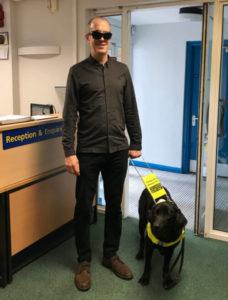
![]() Insights
Insights
Company News

Search Laboratory had recently begun raising awareness and funds for Guide Dogs for the Blind, and I wanted to find a way to effectively show people exactly why we chose this charity and the crucial role they play in the community. So here it is, my blind for a day challenge. (You can see a roundup of the day in the video below).
Before I got out of bed in the morning, I put on full blackout goggles and didn’t take them off again until I went to bed. It was a normal workday, so I had to get dressed, get to work, do a full day at work, come home, visit my dad in the hospital, have tea, and get ready for bed. Coincidentally, on the same day the Guide Dogs team in Leeds were doing guided walks through the streets of Headingley, so I got a taxi there and experienced using a guide dog for an hour.
Although I knew it wasn’t going to be easy, a lot of what I learnt still came as a surprise.
Obviously, I’d known this was going to be challenging, however, what I wasn’t expecting was a relentless series of challenges. Everything from eating, drinking, getting around and going to the toilet was a challenge. Every few minutes there was another obstacle. Some were small, but some were very hard, and at the end of the day I was exhausted.
I naively assumed that having no sight would mean my other senses would sharpen, but this wasn’t the case. In meetings, it took me ten minutes just to understand what was going on, because my mind was still on the journey there and thinking about what I’d be doing next – how was I going to get to my next meeting? How would I know what time to go? The first meeting of the day involved discussing statistical tests to measure the effectiveness of a machine learning system, which isn’t a great way to ease into the day…
The scariest moment of the day was unfolding the cane and stepping outside to get in the taxi to work. Indoors there are reference points and things to hold on to, but outdoors these aren’t available. Unfolding the cane was really unsettling, I’m not sure why. I think it was the sense of dependence on something I had little idea how to use.
By people, I mean the taxi driver in the morning. Approaching the taxi, I didn’t know how I was going to get in. I could hear the engine but had no clue which end was the front, where the door was or how to find the handle. As soon as he saw me the taxi driver got out and guided me in perfectly. I’m not sure if he has experience with blind people but he put my hand on the door, so I knew exactly where I was. On speaking to other people with sight loss the following day, they all had mixed experiences with taxi drivers. Some were great, like mine, but others, I was told, won’t even stop when they see the dog. Mine was brilliant. I couldn’t have got in without him.
Walking in urban areas felt almost impossible without sight unless someone is guiding you. Indoors is okay because the walls help you but try closing your eyes outdoors and getting even a short distance. Without my dog (named Pip), there’s no way I could have walked through the busy streets of Headingley, avoiding obstacles, staying on the path and crossing busy roads. I don’t know what else to add – without a dog, I can see why most blind people end up staying indoors and losing all independence.
The following day, the local Guide Dogs for the Blind Association held a meeting at our offices. Many of the people who attended are blind or partially-sighted, and some of them had guide dogs. I was very concerned that they may think my ‘stunt’ didn’t represent what they truly had to go through, so I was a bit wary of mentioning it. However, one of the staff members called me over at lunchtime to chat with them about the day. We shared experiences: they were interested in what I found most difficult, and it was great to compare notes on what we found hardest to cope with. It was great to talk through the challenges and I felt privileged to speak with them about this.
Sign up to our emails to get the latest digital news delivered to your inboxSign up now
The day was hard, but it was only one day, and ultimately, I always had the option of taking off the goggles. People with sight loss can’t do that, and the average wait time for a guide dog is nine months, which is the equivalent of doing what I did 270 times. I hope this point alone is enough to illustrate the vital role Guide Dogs play, as my experience would have been very different without Pip.
Please give generously to this cause and help reduce the wait time and train the guide dogs that we need, you can donate here.
You can watch the video of my day below.

![]() Insights
Insights

![]() Insights
Insights

![]() Insights
Insights